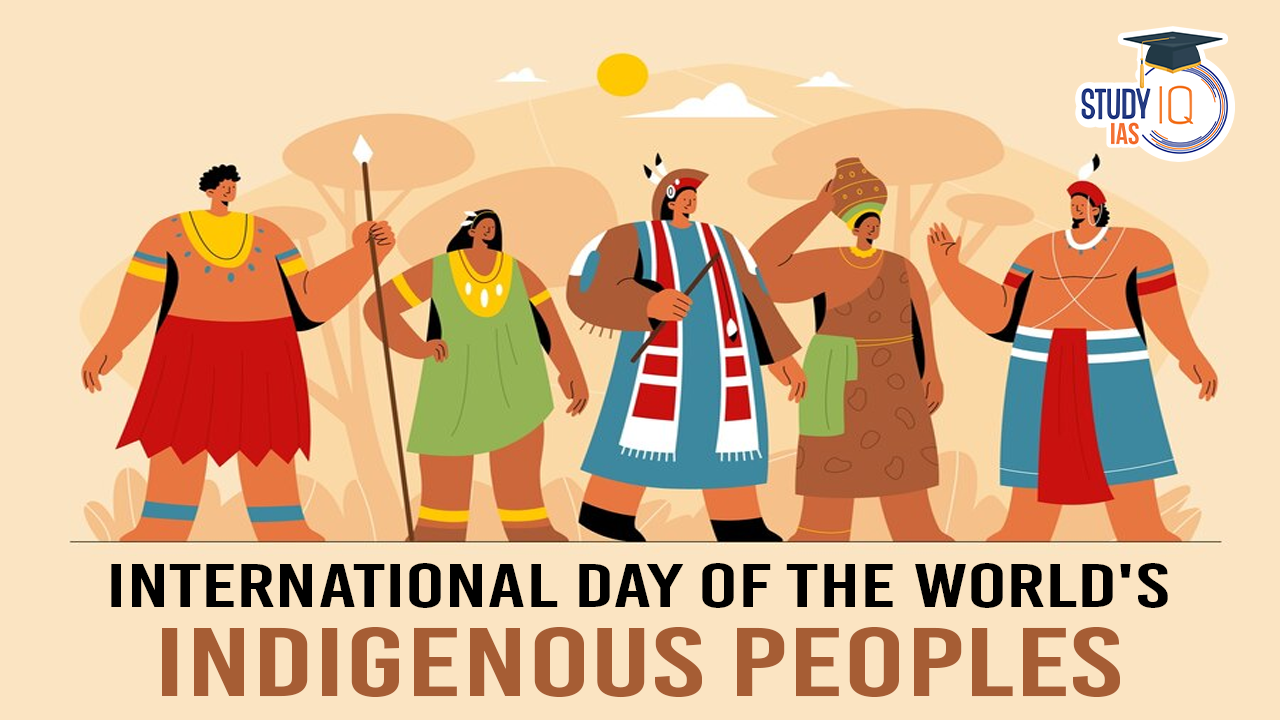Table of Contents
The International Day of the World’s Indigenous Peoples, also known as World Tribal Day, is observed on August 9 each year to raise awareness and protect the rights of the world’s indigenous population. This article covers International Day of the World’s Indigenous Peoples 2024.
World Tribal Day 2024
The United Nations General Assembly officially established the International Day of the World’s Indigenous Peoples on December 23, 1994. The designation followed the first conference of the United Nations Working Group on Indigenous Populations (UNWGIP) held on August 9, 1982. This observance was created to increase global understanding of the challenges faced by indigenous peoples and to promote their rights and cultural heritage.
| Key Detail | Information |
|---|---|
| Date | August 9, 2024 |
| Also Known As | World Tribal Day / Adivasi Day |
| Theme | Protecting the Rights of Indigenous Peoples in Voluntary Isolation and Initial Contact |
| Year of Adoption | 1982 |
| UN Resolution | Resolution 49/214 |
| Total Groups | Approximately 200 groups |
| Global Population | Around 476 million |
| Cultures | More than 5,000 |
| Linguistic Diversity | Over 7,000 languages |
| Primary Regions | Bolivia, Brazil, Colombia, Ecuador, Indonesia, India, Peru, Papua New Guinea, Venezuela |
International Day of the World’s Indigenous Peoples 2024 Theme
The 2024 theme, “Protecting the Rights of Indigenous Peoples in Voluntary Isolation and Initial Contact,” highlights the importance of safeguarding the rights of indigenous groups who have chosen to remain isolated from broader society. These groups play a crucial role in protecting natural resources and maintaining ecological balance. Respecting their land rights is essential for both their communities and the environment, as it helps preserve their cultural and linguistic diversity.
Who Are Indigenous Peoples?
Indigenous peoples are ethnic groups with unique cultures, traditions, languages, and beliefs, native to specific regions or countries. Despite representing less than 6% of the global population, they face significant challenges, including extreme poverty and threats to their land and environment. Indigenous territories cover 28% of the Earth’s surface and include 11% of the world’s forests. Their self-sufficient food systems produce 50% to 80% of their own food and resources, showcasing their deep connection to and stewardship of the environment.
UNESCO Policy on Engaging with Indigenous Peoples
UNESCO has a dedicated policy framework for engaging with indigenous peoples, which includes promoting their rights, supporting their cultures and languages, and integrating traditional knowledge into UNESCO programs. Each year, UNESCO commemorates the International Day of the World’s Indigenous Peoples by showcasing relevant projects and activities. The UN Declaration on the Rights of Indigenous Peoples (UNDRIP) sets global standards for these rights, guiding international efforts to support indigenous communities.
Challenges Faced by Indigenous Communities
Indigenous peoples face numerous challenges, including:
- Land Rights: Many indigenous groups struggle with land encroachments, deforestation, and climate change, threatening their traditional lands and ways of life.
- Cultural Preservation: The erosion of indigenous languages and traditions is a significant concern. Efforts are being made to revitalize and promote these cultures through festivals, educational programs, and digital archives.
- Access to Services: Disparities in healthcare and education persist, impacting many indigenous communities. Initiatives to improve infrastructure and integrate traditional knowledge with modern practices are essential for addressing these issues.
Call to Action
On this International Day of the World’s Indigenous Peoples, it is crucial to take meaningful actions to support and advocate for indigenous rights. This can be achieved by:
- Educating Yourself and Others: Learn about indigenous cultures, histories, and current issues to foster a deeper understanding and respect.
- Supporting Organizations: Contribute to or volunteer with organizations that work to protect indigenous rights and promote cultural preservation.
- Advocating for Policy Change: Support policies and initiatives that recognize and uphold the rights of indigenous peoples and address their challenges.
Objectives of World Tribal Day
- Raise Awareness: Increase global understanding of indigenous rights and challenges.
- Celebrate Cultures: Honor and recognize the rich traditions and contributions of indigenous communities.
- Advocate for Land Rights: Support the protection and recognition of indigenous land rights.
- Support Cultural Preservation: Promote efforts to preserve indigenous languages and traditions.
- Promote Environmental Stewardship: Highlight the role of indigenous peoples in environmental conservation.
- Address Disparities: Focus on improving healthcare and education access for indigenous communities.
- Encourage Solidarity: Foster global support and collective action for indigenous rights.
- Highlight Achievements: Recognize progress and successes of indigenous communities.
- Foster Dialogue: Promote mutual respect and cooperation between indigenous and broader societies.
- Raise Awareness of Specific Issues: Address targeted themes and issues relevant to indigenous peoples.
World Tribal Day 2024 Celebration
- Cultural Festivals: Traditional dances, music, and heritage performances.
- Educational Workshops: Seminars on indigenous rights and history.
- Art Exhibitions: Showcasing indigenous artwork and crafts.
- Public Awareness Campaigns: Social media and print media promotions.
- Community Gatherings: Dialogues within and outside indigenous communities.
- Advocacy Forums: Policy discussions on indigenous rights and land.
- Cultural Performances: Traditional dances, music, and storytelling.
- Film Screenings: Documentaries on indigenous lives and issues.
- School Campaigns: Programs teaching students about indigenous cultures.
- NGO Collaborations: Support for indigenous rights and development projects.
- Public Demonstrations: Rallies and protests advocating for indigenous rights.
- Virtual Events: Online webinars and digital showcases for global participation.
- Commemorative Statements: Messages from leaders and celebrities supporting indigenous communities.
International Day of the World’s Indigenous Peoples’s Significance
- Recognition of Rights: Highlights the importance of acknowledging and protecting the rights of indigenous peoples.
- Celebration of Cultures: Celebrates the rich cultural heritage, traditions, and contributions of indigenous communities.
- Advocacy for Land Rights: Brings attention to the critical issue of land rights and the impact of encroachments and environmental threats.
- Preservation of Heritage: Emphasizes the need to preserve indigenous languages, customs, and traditional knowledge.
- Promotion of Environmental Stewardship: Acknowledges indigenous peoples as key guardians of biodiversity and natural resources.
- Highlighting Disparities: Focuses on addressing healthcare, education, and socio-economic disparities faced by indigenous communities.
- Encouragement of Global Solidarity: Promotes international support and collective action to uphold indigenous rights.
- Fostering Dialogue: Encourages constructive dialogue between indigenous peoples and broader society to build mutual respect and cooperation.
- Raising Awareness of Specific Issues: Addresses targeted themes relevant to indigenous peoples’ current challenges and needs.
- Celebration of Achievements: Recognizes and celebrates the progress and successes achieved by indigenous communities globally.
World Tribal Day UPSC
International Day of the World’s Indigenous Peoples 2024 is more than a day of celebration; it is an opportunity to honor the rich heritage of indigenous communities and commit to actions that support their rights. By recognizing their invaluable contributions and addressing their challenges, we can work towards a more inclusive and equitable world. Let us embrace this day as a call to action to ensure that indigenous cultures and traditions continue to thrive for generations to come.


 Miss Universe Winners List From 1952 to ...
Miss Universe Winners List From 1952 to ...
 Significance and History of Diwali Festi...
Significance and History of Diwali Festi...
 Asia Cup Winners List (1984–2025): Ind...
Asia Cup Winners List (1984–2025): Ind...

























